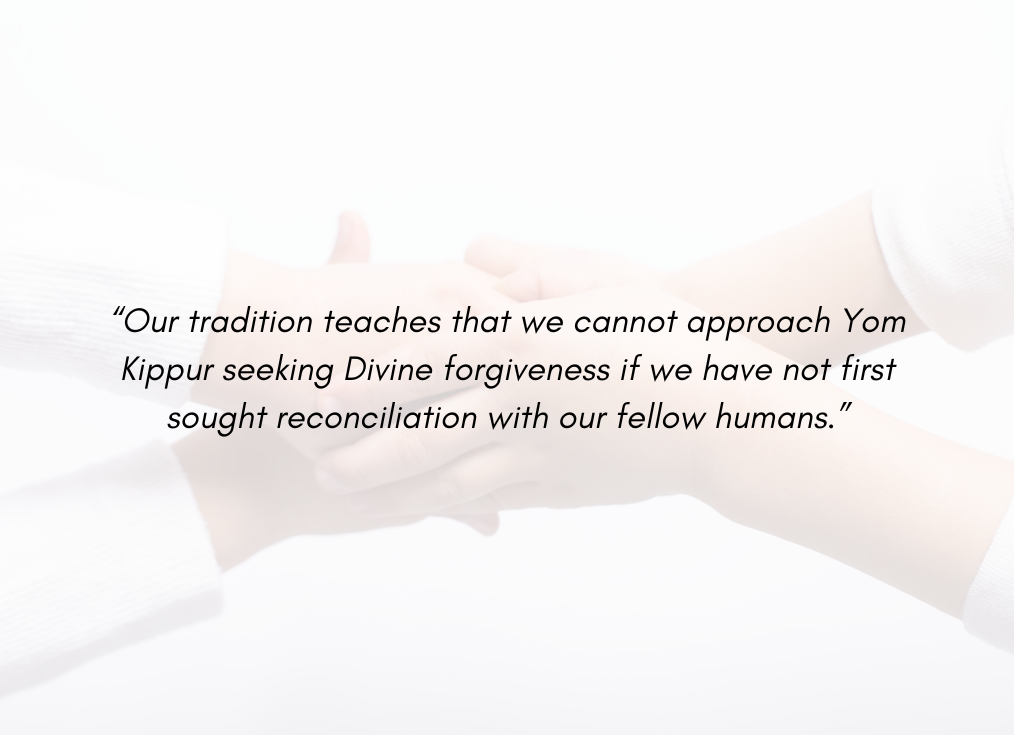Returning to Our Essence

Shabbat Shalom and G’mar Chatimah Tovah,
As we enter Shabbat Shuvah, the Shabbat of Return, we find ourselves in a profound moment of reflection and spiritual growth. This special Shabbat, nestled between Rosh Hashanah and Yom Kippur, derives its name from the opening words of the Haftorah reading: “Shuvah Yisrael” – “Return, O Israel” (Hosea 14:2). This call to return resonates deeply with the essence of teshuvah, or repentance, which is at the heart of this season.
Teshuvah, sharing its root with “shuvah,” embodies the concept of return – a return to our true selves, to our values, and to our relationship with the Divine. It is a process that unfolds in three critical stages, each building upon the last to create a transformative journey of self-improvement and spiritual renewal.
The first stage of teshuvah is acknowledgment. We must recognize and admit our mistakes, taking full ownership of our actions without excuses or deflections. This often begins with a simple yet profound apology, a verbal acknowledgment of our error, often resulting in the “I’m sorry” statement. It is in this moment of vulnerability that we open the door to growth and change.
…
The second stage is retribution or correction. Here, we actively work to right our wrongs. If we have caused damage, we seek to repair it. If we have hurt someone, we strive to heal the wound. This stage is about taking concrete actions to address the consequences of our mistakes, demonstrating through our deeds that we are committed to change.
The third and perhaps most challenging stage is commitment. We must resolve, with all our heart and soul, to never repeat the same mistake. This commitment to change is the lynchpin of true teshuvah. It is here that we are called to transform not just our actions, but our very selves. However, this stage carries a weighty responsibility: if we falter and repeat the same error, we not only compound our mistake but also nullify our previous teshuvah, no matter how long ago it was made. This teaches us that teshuvah is not a one-time act but a continuous process of growth and self-improvement.
The concept of “return” in teshuvah is beautifully complex. We are not simply returning to a state of innocence before our mistake, but rather to our essential selves – the version of us that aligns with our highest values and deepest connections to the Divine. As Rashi explains, we are commanded to return through our own volition to the Gd of Mercy, while we still have the opportunity, rather than being compelled to face the Gd of Justice.
As we stand in this moment of return and renewal, we are reminded that Rosh Hashanah is not just a time of judgment but also of new beginnings. In this spirit, just as we will soon roll the Torah scroll back to Genesis, ready to start anew, this column too will undergo a transformation in the coming year, bringing fresh perspectives and opportunities for growth in 5785.
In the spirit of this season, it is customary to seek forgiveness for any unintentional wrongs or oversights. Our tradition teaches that we cannot approach Yom Kippur seeking Divine forgiveness if we have not first sought reconciliation with our fellow humans. In this spirit, I humbly apologize if my words or actions have caused any pain, disappointment, or wrongdoing, whether known or unknown to me.
As we approach the culmination of the High Holy Days, let us each take a moment to reflect on our relationships – with our neighbors, colleagues, friends, and family. Let us strive to right any wrongs, to heal any rifts, and to enter the new year with a clean slate. May we all be blessed with a year of peace, joy, and success in all our worthy endeavors and may we all be inscribed and sealed in the Book of Life for a good and sweet new year. Because we are…
Shabbat Shalom.

